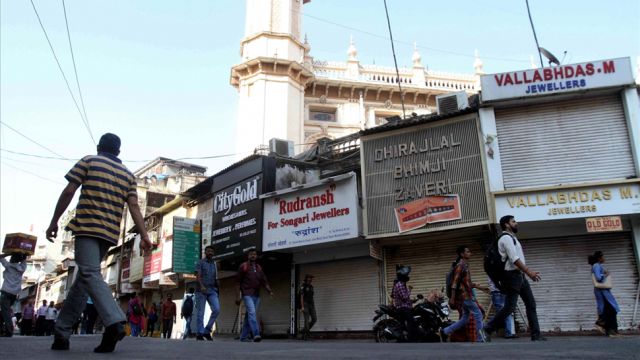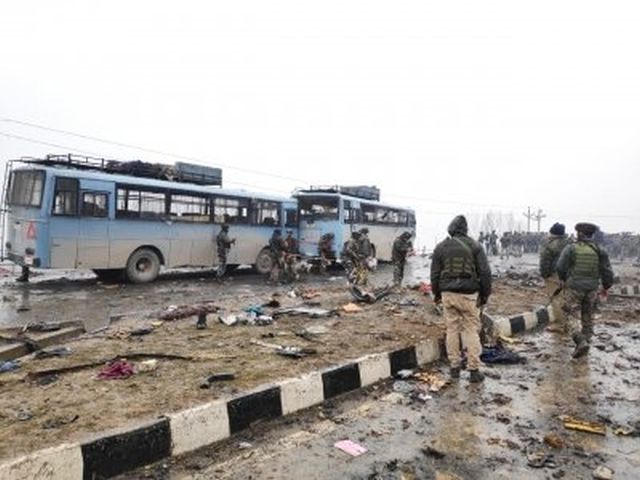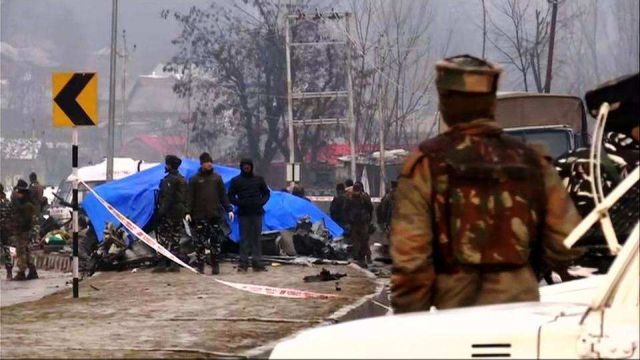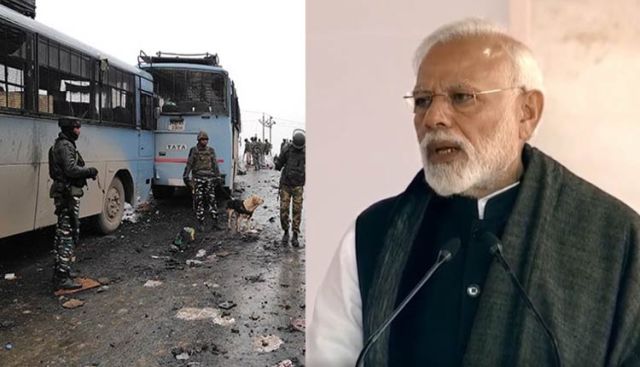
by Editor | May 25, 2021 | Economy, Markets, News

Traders call for Bharat bandh against Pulwama attack (Image: Zee News)
New Delhi : The Confederation of All India Traders (CAIT) on Monday said that business worth about Rs 25,000 crore was hit due to the “Bharat Trade Bandh” that was called to protest against the recent Pulwama terror attack.
According to CAIT, the day-long bandh saw seven crore business establishments remain closed across the country, including Delhi.
“Business of about Rs 25,000 crore was hit due to today’s ‘Bharat Trade Bandh’,” the confederation said in a statement.
“In the wake of tremendous and spontaneous voluntary response from traders across the country, the CAIT has decided to create a Special Relief Fund exclusively for the welfare of the forces,” it said.
In the worst-ever terror attack in Jammu and Kashmir since militancy erupted in 1989, a suicide bomber on Thursday rammed his SUV packed with explosives into a CRPF bus on the Srinagar-Jammu highway in Pulwama district, killing as many as 40 troopers and leaving many injured.
—IANS

by Editor | May 25, 2021 | Opinions
 By Amulya Ganguli,
By Amulya Ganguli,
One of the most disturbing aspects of the February 14 terror attack in Pulwama was that the suicide bomber was a local, Adil Ahmad Dar, who lived in a village near the Jammu-Srinagar highway where the attack took place.
Although indoctrinated as a fidayeen by the Pakistan-based Jaish-e-Mohammad, Dar’s act as a jehadi underlines the vulnerability of impressionable Kashmiri youths to insidious anti-India propaganda by Pakistani terror groups nurtured by the Deep State comprising the country’s army and an espionage agency.
In this particular instance, Dar was apparently “inspired” to kill himself by the Taliban’s “victory” signified by American withdrawal from Afghanistan. If anything, the tragedy emphasises the inter-linked international dimensions of Islamic terrorism.
From Syria to Afghanistan/Pakistan to Kashmir, the jehadi mindset is primed among the youth by the mythical Islamic Caliphate’s war against the kafirs (infidels).
Unlike West Asia and even in the Afghanistan-Pakistan region, Indian democracy provides a safeguard against a Messianic struggle, which is why an overwhelming majority of Indian Muslims, including those in Kashmir, remain committed to the democratic system.
As much is evident from the recent panchayat and municipal elections in the state even if the polling percentages in the Valley were low.
However, it is undeniable that a section of Muslims in the valley continue to remain alienated notwithstanding the government’s attempts to reach out to them via the negotiations carried out by the Centre’s representative, Dineshwar Sharma.
But if his efforts have failed to defuse the situation, the reason perhaps is the government’s reluctance to implement some of the recommendations to improve the conditions made by the Dileep Padgaonkar Committee.
These included reducing the army’s visibility, addressing human rights violations, reviewing the Armed Forces Special Powers Act (AFSPA) and lifting the Disturbed Areas Act.
In essence, what these initiatives were expected to do was to reach out to the hearts and minds of the ordinary people whose commitment to the Indian state cannot be doubted as the continuing relevance of the mainstream parties like the National Conference and the Peoples Democratic Party show.
What is required to defang the terrorists and wean away the misguided youth from their self-destructive path is a gesture which will have a major impact.
One of them is to consider freezing the AFSPA (former Congress minister P. Chidambaram wanted it to be scrapped altogether) and to give a cast-iron guarantee that neither Article 370 nor Article 35A will be touched. The former confers a special status on Kashmir and the latter relates to citizenship rights.
It is only such “big ticket” reforms which can end the sense of alienation among the youths who are cynically exploited by Pakistan’s Deep State.
An outreach of this nature will confirm that the government does not regard Kashmir merely as a law and order problem, where all that is needed is a harsh crackdown on the malcontents.
Arguably, the Bharatiya Janata Party (BJP) may not find it easy to change its longstanding stance favouring dispensing with Article 370. But it has to be remembered that Atal Behari Vajpayee did put Article 370 in cold storage in 1996 along with his party’s demand for building a Ram temple and introducing a uniform civil code when he was looking for allies to form a government.
Vajpayee had also called for looking at the Kashmir issue within the parameters of insaniyat (humanity) rather than of the Constitution.
Such broadmindedness is the need of the hour to dissuade deluded young men like Dar from the path of nihilism. Otherwise, more and more of such brainwashed youths will leave their kith and kin to court untimely death.
Equally, scores of security personnel will be in danger of losing their lives because official policies have failed to assure the discontented people of a state with a distinct cultural ambience that they are the nation’s cherished citizens.
It is only when the Kashmiris are visibly mollified that Pakistan’s “isolation”, which the Centre is currently seeking, will be complete, for a fully integrated Kashmir will negate Pakistan’s hope of avenging its Bangladesh defeat and recovering the “K” in the country’s name.
India has dealt with rebellious outbreaks in different parts of the country from the Northeast to the Maoist belts in central and western areas with a fair amount of success. There is no reason why it cannot achieve the same in Kashmir with a patient understanding of the grievances affecting the state, especially when it has national-level leaders like Farooq and Omar Abdullah and Mehbooba Mufti with their political and administrative experience.
True, the jehadi factor makes it difficult for a government to adopt a sane attitude because of the irrational pseudo-religious fervour of the militants. But an overt demonstration of being sensitive can enable the government to enlist the overall support of Kashmiri society and enable the elders to rein in the rebels.
(Amulya Ganguli is a political analyst. The views expressed are personal. He can be reached at amulyaganguli@gmail.com)
—IANS

by Editor | May 25, 2021 | News
 New Delhi : The international community has strongly condemned the terror attack by the Pakistan-based Jaish-e-Mohammed (JeM) in Jammu and Kashmir that killed 45 CRPF personnel, with US President Donald Trump asking Pakistan to “end immediately” the support and safe haven provided to all terrorist groups operating on its soil.
New Delhi : The international community has strongly condemned the terror attack by the Pakistan-based Jaish-e-Mohammed (JeM) in Jammu and Kashmir that killed 45 CRPF personnel, with US President Donald Trump asking Pakistan to “end immediately” the support and safe haven provided to all terrorist groups operating on its soil.
“The US calls on Pakistan to end immediately the support and safe haven provided to all terrorist groups operating on its soil, whose only goal is to sow chaos, violence and terror in the region. This attack only strengthens our resolve to bolster counter-terrorism cooperation and coordination between the US and India,” Trump’s Press Secretary Sarah Sanders said in a statement.
“We express our deep condolences to the victims’ families, the Indian government and the Indian people for the loss of life in this brutal attack,” the statement added.
China’s Foreign Ministry on Friday also denounced the attack, hoping that “relevant regional countries will cooperate to cope with the threat of terrorism and jointly uphold regional peace and stability”.
It added that the “JeM has been included in the UN Security Council terrorism sanctions list and that China will continue to handle the relevant sanctions issue in a constructive and responsible manner”.
An operative of the JeM group crashed a car bomb into a convoy of the Central Reserve Police Force (CRPF) in Pulwama district on the Srinagar-Jammu Highway on Thursday, making it the worst ever attack on security forces on any single day since a separatist campaign broke out in Jammu and Kashmir in 1989.
Afghanistan’s President Ashraf Ghani and Chief Executive Abdullah Abdullah stressed the “need for solidarity and closer cooperation of countries in the fight against this common enemy”.
“Terrorism is a cancer in the region and it requires collective efforts to root it out,” Ghani said.
Russian President Vladimir Putin, in a message to Prime Minister Narendra Modi strongly condemned the “brutal crime” and said that “the perpetrators and sponsors of the attack, undoubtedly, should be duly punished”.
Putin reiterated Moscow’s “readiness for further strengthening counter-terrorist cooperation with Indian partners”.
The European Union in a statement said that “as a strategic partner of India, the EU reaffirms its full solidarity at such a difficult moment”.
Saudi Arabia also denounced the “cowardly” attack and said it stands with India against terrorism and extremism.
Canadian Foreign Minister Chrystia Freeland said her country “remains steadfast in its support of the global fight against terrorism,” reaffirming a resolve “to prevent radicalization and defeat terrorism in all its forms”.
Indonesia and Australia also slammed the strike.
The attack further damaged the already tense India-Pakistan diplomatic relations, with New Delhi saying it had evidence of Islamabad’s involvement in the carnage. It also withdrew the Most Favoured Nation trade status it had granted to Pakistan in 1996 under the World Trade Organization rules.
However, Pakistan dismissed accusations that it has links with the militants who carried out the attack. “We strongly reject any insinuation by elements in the Indian government and media circles that seek to link the attack to the State of Pakistan without investigations,” said the country’s Foreign Ministry in a statement.
—IANS

by Editor | May 25, 2021 | News, Politics
 New Delhi : In a stern message to Pakistan, Prime Minister Narendra Modi on Friday said the terrorists have committed their “worst mistake” by killing 45 CRPF troopers in Jammu and Kashmir and said their backers will pay “a very big price”.
New Delhi : In a stern message to Pakistan, Prime Minister Narendra Modi on Friday said the terrorists have committed their “worst mistake” by killing 45 CRPF troopers in Jammu and Kashmir and said their backers will pay “a very big price”.
Modi’s remarks a day after the Pakistan-backed Jaish-e-Mohammad (JeM) claimed responsibility for the Thursday attack in Pulwama.
“We have given complete freedom to the security forces. We have full faith in their bravery and valour,” Modi said while addressing a programme to flag off the first indigenous engine-less Train 18, renamed as Vande Bharat Express, at the New Delhi Railway Station.
He said: “The terrorist groups and those who are giving them shelter are responsible and have committed their worst mistake. They have to pay a very big price.”
Modi also assured the nation that “those powers who are behind the attack will be punished for their deeds”.
Hitting out at Pakistan but without naming it, Modi said: “If our neighbour which is totally isolated in the world thinks it can destabilize India through its tactics and conspiracies, it is making a huge mistake.”
“If our neighbour which is facing the worst ever economical crisis thinks that it can make India unstable, then their dreams will not be fulfiled.”
The Prime Minister’s remarks came minutes after the Cabinet Committee on Security decided to withdraw the “Most Favoured Nation” (MFN) status given to Pakistan. The MFN status to Pakistan was given by India in 1996.
Modi urged the political parties to stay away from politicizing the issue.
“This moment is very important and emotional. All of us should stay away from politics and we should unite together against them,” he said.
The Prime Minister thanked the countries which have supported India and condemned this incident in the strongest of terms. “A strong reply will be given to this attack,” he said.
“When all the countries will fight together against terror, terrorism will be eliminated. The soldiers have sacrificed their lives for the country. I assure everyone that we will take every step to bring the perpetrators of the crime to book,” he said.
Modi then inspected the engine-less Vande Bharat Express along with Railway Minister Piyush Goyal and flagged it off at 11.20 a.m.
Manufactured by the Integral Coach Factory in Chennai, it left from New Delhi at 10 a.m. for Uttar Pradesh’s Varanasi, the parliamentary constituency of Modi.
—IANS




